Part 28: We Actually Have An Army Now
Chapter 18: We Actually Have An Army Now

Our population before the peace with Morocco was nearly 4.6 million, and those Moroccan provinces pushed it to slightly over 5 million. From two hundred thousand to 5.1 million in forty years is not bad.
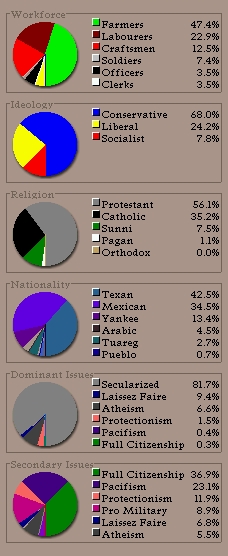
The statistics for our 5.1 million people show that Texan culture continues to grow, thanks to numerous immigrants taking on our customs (drinking) and traditions (fighting, and also drinking).
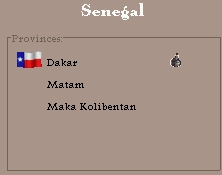
Our mission in Dakar is completed and we start another claim in Maka Kolibentan, which is a pretty cool name for a province.
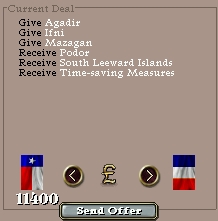
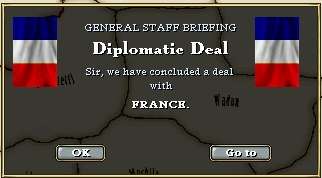
France is, as we expected, very eager to buy the three Moroccan provinces from us. In return for those provinces we receive Podor (a coastal Africa colony that would soon be surrounded by our claims anyway), France's island possessions in the West Indies, a very beneficial economic technology, and £11,400.
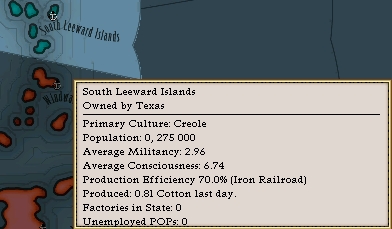
The South Leeward Islands have a population that could likely support a factory but we are considering using it as a bargaining chip with the United States in the future. America would probably be very interested in acquiring a Caribbean possession, and we've grown rather attached to the Bahamas.

The study of Experimental Psychology begins. The prestige percentage bonus provided by cultural techs might actually begin to show itself when we start claiming more colonies.
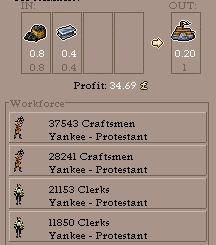
We've been educating people in Hawaii to fill the Steamer factory there when we can spare the resources, and it is now producing a steamer every five days, at a profit of £35 per day, which is great. We are anxious for the capitalists to finish the steel railroad there and for us to be able to fill the factory (only 4 pops there currently).
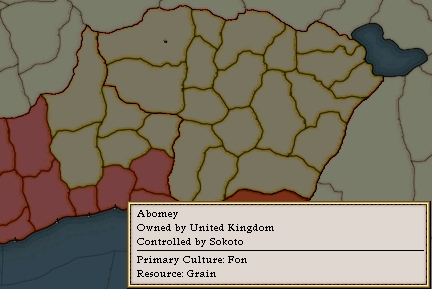
The United Kingdom, who declared war on Sokoto a few months before our conflict with Morocco, seems to have hilariously underestimated Sokoto's military capabilities and are now losing ground in their nearby African colonies to the natives.
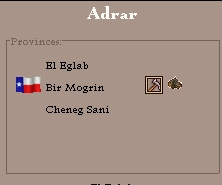
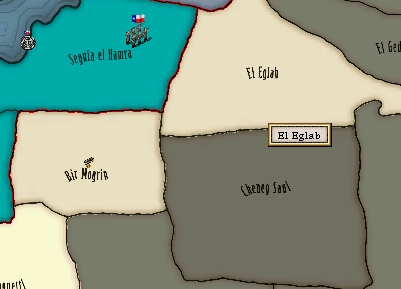
We start spreading east from Rio de Oro, beginning construction on a colony in Bir Mogrin and two weeks later another in El Eglab.
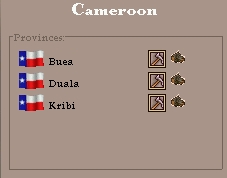
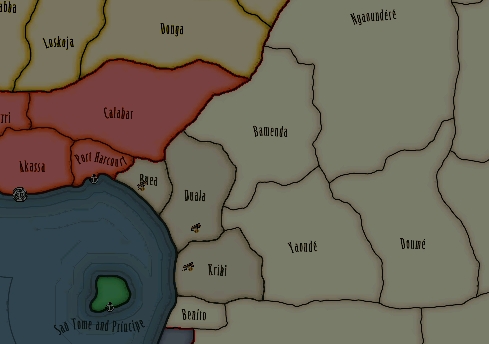
Completion of a naval base in the province of Rio de Oro opens up the southern half of the west African coast to our colonization efforts. We begin construction of three claims in Cameroon, southeast of the conflict going on between Britain and Sokoto.
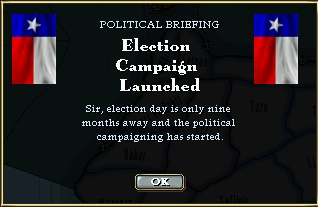
Another four years has gone by, and it is time for a new election.
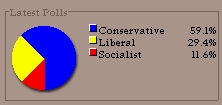
Ideologically, the conservatives are slowing losing people while the socialists slowly make gains.
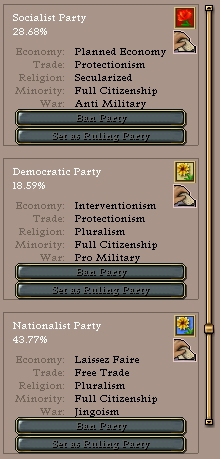
Changes in the party polls since last time are more drastic. The Nationalists are polling at below 50% for the first time since they've returned to power, and the Socialists are polling very well, at 29%.
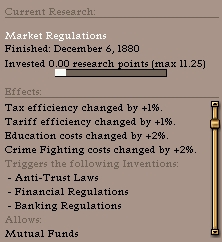
More economic research!
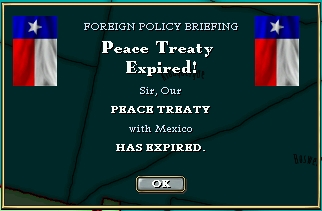
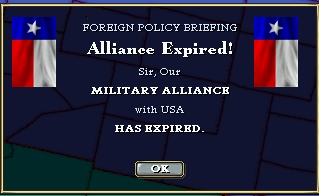
We should have remembered five years ago when the peace with Mexico was signed that we shouldn't rush into an alliance with the United States, but we must have been hitting the open bar at the peace ceremonies pretty hard again.
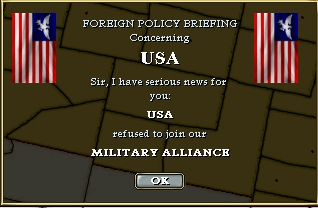
The United States is refusing our offers for a new alliance, and we decide to not push the issue any further and risk hurting Texan-American relations.
Mexico could invade any day, and a third of our small army is on another continent. We must prepare for the inevitable, and it cannot be a handful of active divisions and 8 in reserves like last time. We are going to need a larger army on the Mexican border, and a greater pool of reserves.
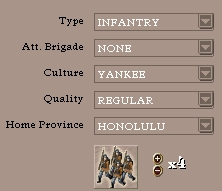
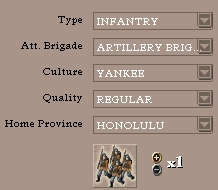
Four regular divisions and another with an artillery brigade are recruited out of Honolulu, which is where the majority of the Republic's inactive soldiers are now.

Ruiz is ordered to get back on the transports; we have another mission for him.
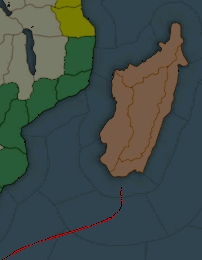
Ruiz sets for the southern coast of Madagascar, a place we've had our sights on for a little while now. It is home to valuable tropical wood production and a large population that we could draft into our army. It would also serve as an important refueling and resupply station should we attempt to attain holdings in East Africa or Arabia.

The United States has declared war on Mexico. American President James Blaine (who succeeded Andrew Johnson after his mysterious death in 1876) has been very quiet about what the goal of this war might be.
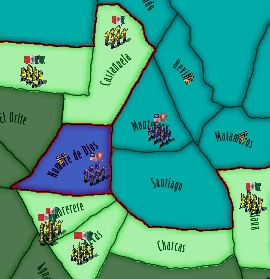
The situation in Nombre de Dios is unfortunate for the troops there. Surrounded by Mexican troops, they will surely be slaughtered.

On May 4, 1880 we issue our own declaration of war against Madacasgar. General Ruiz immediately begins the invasion of Madagascar's eastern province.
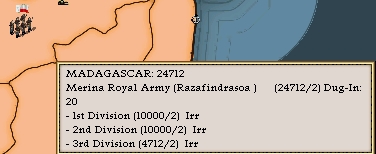
Once he lands, we find out Madagascar actually has an army bigger than Ruiz's forces, but we do not worry, as our forces are superior to theirs in every other way.
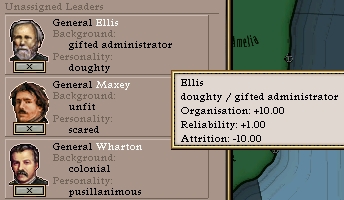
Two more generals are promoted. General Wharton is just more of what we've come to expect from the Texan military institution, but General Ellis turns out to be a great general and probably the best one we've had since Houston. Ellis has been studying our military actions in Africa and is an expert at avoiding troop attrition in harsh locales. After Ruiz finishes Madagascar Ellis will be put in charge of those forces.
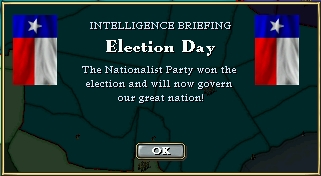
The Nationalists win the elections again, but this time with only a plurality of the vote. President Throckmorton returns to office. Nationalist domination of Texan politics is turning the Office of President into a position held by only a handful of different men so far.
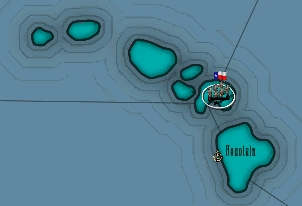
The first batch of Hawaiian soldiers are ready for transport to the mainland. Our two Pacific transports will have to make repeated trips to Honolulu to pick up all the men; we are considering building more transports to accomodate the fact that a large part of our renewed military will be coming from our Pacific islands.
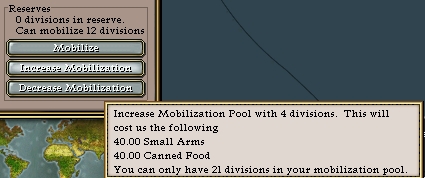
We've also been steadily increasing our pool of reserves, which will now be at 16 divisions.
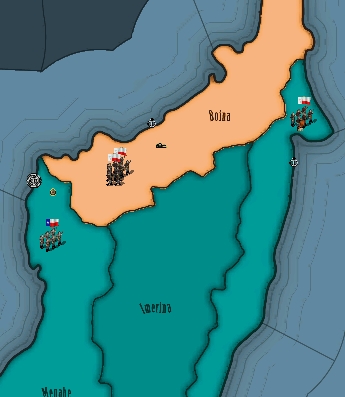
Six months into the war and Ruiz has captured three of the four provinces on the island. But now the enemy has split up its army and Ruiz is going to be forces to chase the natives and hope to take the whole island before they can free some of it.
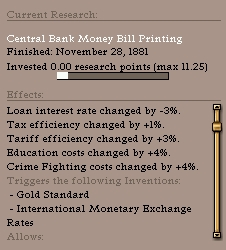
More economic research continues. This newest one enables an invention that is sure to improve the economy of our Republic, the Gold Standard!
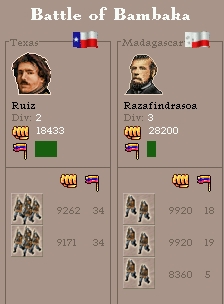
General Ruiz is able to catch the natives' army all in one province, under the command of their General Razafindrasoa. We are expecting an assured victory.
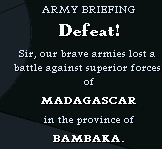
But Ruiz blows it. His men are forced to retreat, and he is relieved of his command and ordered back to Texas. General Ellis will be taking his place.

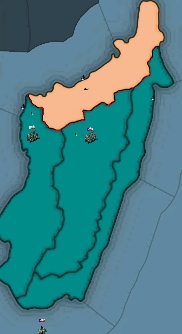
Thanks to Ruiz's failure the war lasts an entire year. We do not wish to drive the natives entirely off the island yet, so do not annex them and settle for leaving them with their northern capital province. The populous tropical wood producing province of Imerina (the central landlocked province) was what we really desired anyway.
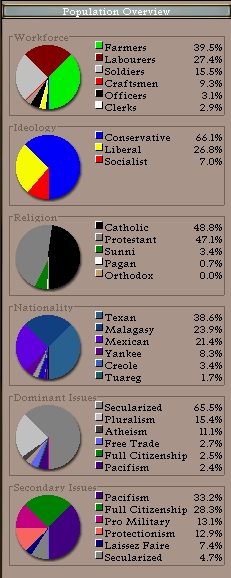
The population of our Republic jumps to 8.5 million following the conquering of Madagascar. The Malagasy natives of Madagascar now make up 23% of our population. For reasons unknown to us the Malagasy are largely Catholic and their addition to the population now pushes the number of Catholics in our nation slightly over the number of Protestants (fortunately there are also some Malagasy Protestants so it was not too bad). Madagascar is also heavily mobilized, hence soldiers edging out craftsmen as the 3rd most common occupation.
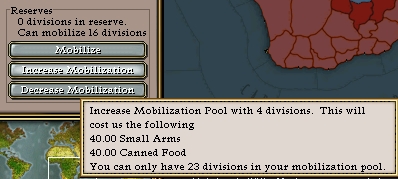
Our reserves are increased to twenty divisions. Texas is much more militarized than it has ever been before, but to compete with Mexico we still need many more troops.
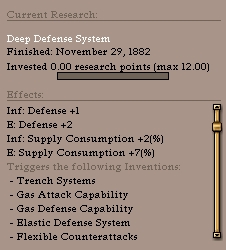
The scientific establishment turns to naval technology once again, wishing to not lag behind too badly in that area of study.
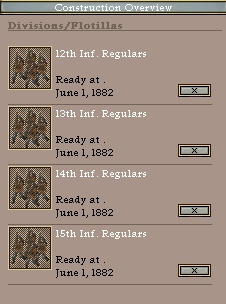
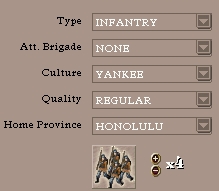
Four more divisions are being formed, but this time out of drafted farmers in California. A little later we begin recruitment of four more Yankee Hawaiian divisions.
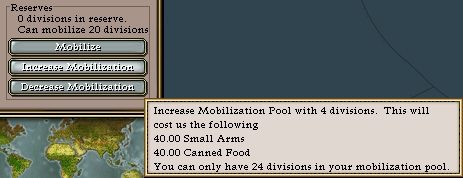
Our reserves are increased to the most our population can currently support, 24.

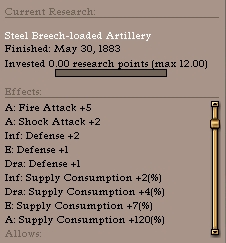
A brilliant American scientist has immigrated to Texan California and has brought with him their knowledge of Deep Defense Systems, enabling us to turn our research to Steel Breech-loaded Artillery. Can't go wrong with bigger, better guns.

The 6th American-Mexican War (overall 8th war between the US and Mexico) comes to a close with a white peace, which we expected. The US has shown in the past its inability to conduct successful invasions of Mexico by sea.
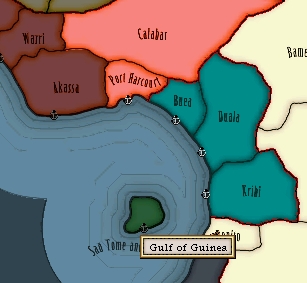
Our three claims in Cameroon are completed and we claim Cameroon as a sovereign territory of the Republic.
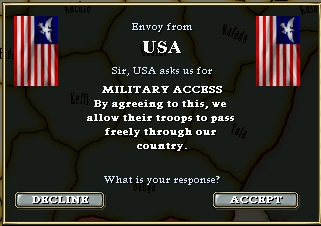
While we are appropriating funds for the creation of claims in the interior of Cameroon and to its south, we receive an envoy from the United States. He asks permission for American troops to pass freely through the Republic. Wishing always to keep relations between our nations close, we let them know that American troops are always welcome in the Republic.
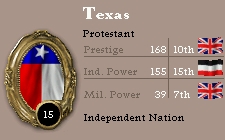
Our recent military buildup and colonial expansions have caused our rank to go up to 15th. Particularly of note is that we now boast the 7th highest ranked military, considering that it was nonexistant only a few years ago.
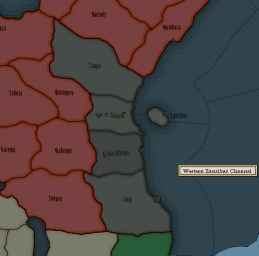
Germany has annexed the native African nation of Zanzibar, establishing a presense on the continent. This is likely a sign that the Germans have become interested in colonization too, seeing the success of French, British and Texan efforts.
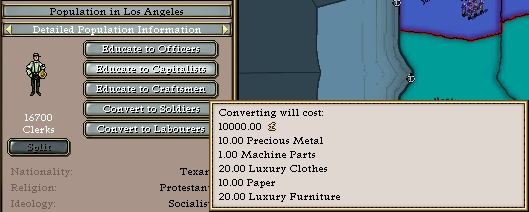
We decide to begin industrializing California, and the first step is recruiting capitalists. Seventeen thousand farmers in Los Angeles are educated to clerks then capitalists. California is by far the most populous state in the Republic, so we anticipate being able to support many profitable factories in it.
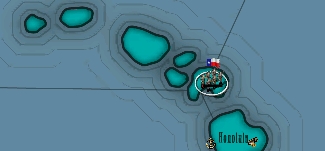
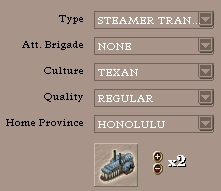
Forty thousand more troops are ready in Honolulu, and we are going to construct two more transports so that we can transfer them and future Hawaiian divisions to the mainland all at once.

Mexico goes to war with the USCA once again. The last Mexican-Central American war ended in a white peace, due to the US starting this last war. Now that it has a five year peace with America, Mexico is free to be more aggressive towards the USCA.
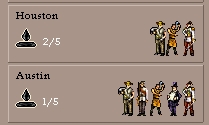
Oil is struck in the province of Austin. Prospectors continue to search for oil in the other Texan provinces; though oil is still cheap, demand for it is climbing as new technologies begin to make us of it as a fuel.
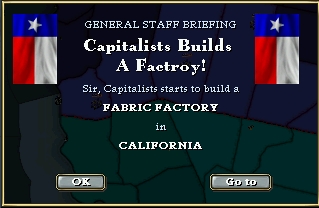
The economic situation and policies of our nation are bountiful for our capitalists, and the capitalists in Los Angeles announce that construction of a fabric factory has begun. Fabric fetches a low price compared to other factory-produced goods, but it is used in the production of a much more profitable product, clothing. And we produce the cotton that will be used for the fabric on our Caribbean possessions.
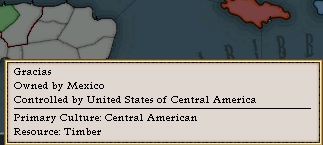
Mexico should really plan out these wars with the USCA a little better. We know they will eventually move more troops south and win the war, but we wonder if they fear our growing military power so much that they don't want to move troops away from their border.
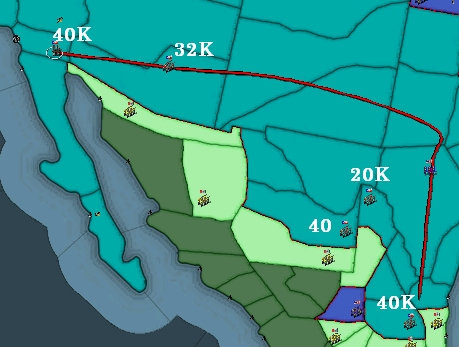
Speaking of troops, the two additional Pacific transports were completed and the forty thousand additional men have landed in San Diego. They are to make their way by train to Matamoros. We now have 17 divisions along the border with Mexico and are within 15 military score of them. The next time we go to war with Mexico, perhaps they will not be the ones who start it.